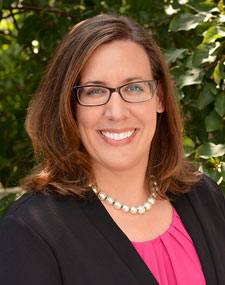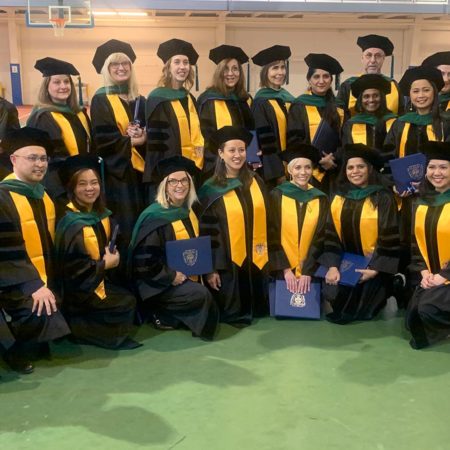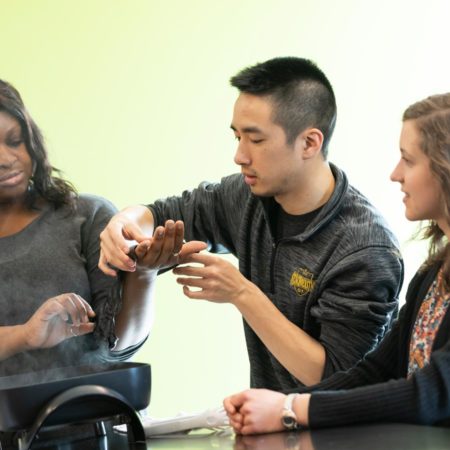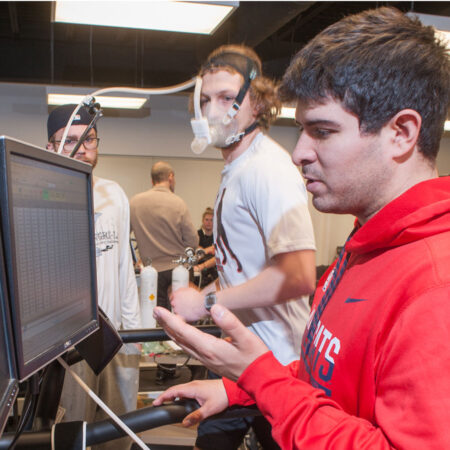Doctor of Physical Therapy (DPT)
The Doctor of Physical Therapy (DPT) program at St. Scholastica blends Benedictine values with expert education in movement science. You’ll learn how to improve clients’ quality of life by treating movement difficulties. Earn your DPT degree at our Duluth campus to transform lives through exercise, education and hands-on therapies.
A Distinctive Approach to Physical Therapy
The Doctor of Physical Therapy (DPT) program will prepare you to be a highly-skilled clinician, an innovative scholar and a compassionate leader in healthcare. Through a blend of on-campus physical therapy learning, integrated clinical experiences in the maurices Community Clinic, and full-time community-based clinical internships, you’ll acquire practical skills and compassionate care techniques. As a DPT graduate, you’ll be clinic-ready and prepared to provide professional, patient-centered, high-quality care for your community.
Start your DPT journey to gain the skills, knowledge and values to excel as a healthcare provider and leader!
DPT Program Fast Facts
- High clinical and patient interaction through on-campus clinic and internships
- 94.7% overall licensure exam pass rate; 87.2% first-time licensure exam pass rate (2023 and 2024 cohorts)
- 100% Graduation rate (2023 and 2024 cohorts)
- 100% Employment rate (2022 and 2023 cohorts)
- Classes held at the Health Science Center at BlueStone, located at 940 Woodland Avenue in Duluth
- A U.S. News & World Report ranked top Health Grad School
- Full-time day program of 109-credits; takes 33 months to complete
Receive Program Info and Financial Aid Options
- Detailed program overview
- Personalized financial aid
- Individual admissions support
Contact Us
 Courtney Eickman
Courtney Eickman
Assistant Director, Enrollment Management
218-625-4823
ceickman@css.edu
Info Sessions
Attend an event to learn more.
The faculty here are mentors who genuinely care about the students’ growth and guiding them to achieve their individual goals.
Degree Details
Tuition and Fees
Tuition: $962/credit*
* Tuition rates are for the 2025-26 academic year. Additional fees and costs for course materials may apply. Total program cost and completion time varies depending on transfer credits and individual program plans. Tuition rates are subject to change. View 2024-25 rates.
Costs and Fees
For more information about course and program fees, and estimated costs, view the Financial Fact Sheet.
Internship Expenses
Expenses associated with internships are the responsibility of the student. Travel and housing while on internship are arranged by the student.
College of St. Scholastica is registered as a private institution with the Minnesota Office of Higher Education pursuant to sections 136A.61 to 136A.71. Registration is not an endorsement of the institution. Credits earned at the institution may not transfer to all other institutions.
Program Overview
Shaping Future Leaders in Physical Therapy
Our DPT program is built on a values-based, student-centered approach that prepares students to be innovative scholars, leaders and clinicians. We empower future physical therapists to serve as primary providers and entry points to healthcare, ensuring access to high-quality rehabilitation for all communities.
DPT Program Overview
- Year 1: Foundational sciences and hands-on clinical skill acquisition
- Year 2: Advanced problem-solving, clinical reasoning and real-world application
- Year 3: Three immersive 12-week clinical internships, culminating in a capstone case study presentation
State-of-the-Art Learning Environment
The Health Science Center at BlueStone includes state-of-the-art classroom spaces, a research laboratory, meeting spaces and designated student lounges. Exceptional aspects of the DPT program include:
- Anatomy and Neuroscience human gross anatomy laboratory
- State-of-the-art St. Scholastica Simulation Lab to learn acute care physical therapy with standardized patients
- Sensorimotor Behavior Lab, including a 12-camera motion capture system, four integrated force plates, wireless EMG, in-shoe pressure measurement system and an isokinetic dynamometer for faculty and student research projects
- The maurices Community Clinic is an onsite teaching and learning clinic providing an interdisciplinary space for students to practice physical therapy alongside faculty and peers while serving the community
- An emphasis on experiential learning: the onsite clinic, simulations and local clinic partnerships provide numerous opportunities for hands-on application before full-time clinical internships. St. Scholastica DPT students interact with patients early to hit the ground running when they start their first internship.
Faculty Who Inspire and Challenge
Our dedicated faculty, who are active practitioners, researchers and mentors, bring a blend of academic excellence and clinical expertise to the classroom. They are committed to shaping the next generation of physical therapists through engaging instruction and hands-on mentorship.
Professional Physical Therapy Growth Beyond the Classroom
Students’ professional development is emphasized throughout the program through advising, reflection and goal setting. We emphasize professional development through the following:
- Membership in the American Physical Therapy Association
- Advocacy and community engagement initiatives
- Scholarly research participation
- Attendance and presentation at state and national conferences
Education Driven by Values for Lifelong Meaningful Work
St. Scholastic’s physical therapy degree program is built upon a foundation of values shared by the physical therapy profession and the College’s Benedictine heritage. These values shape our approach to education, clinical practice, research and service, and ensures that graduates are prepared to be compassionate and competent healthcare providers. We see the interaction of Benedictine values and PT core values in the following ways:
- Love of Learning is reflected in the professional core value of excellence
- Respect is seen in the professional values of accountability, compassion/caring, and integrity
- Community is evident in the professional values of altruism and social responsibility
- Hospitality is realized through the professional values of compassion/caring and professional duty
- Stewardship is demonstrated through the professional values of excellence and social responsibility
Curriculum
Visit our Catalog to view the program, course and degree requirements, and learning outcomes. Be sure to create your course plan in consultation with your advisor.
The Physical Therapy program is a post-baccalaureate, graduate program leading to a Doctor of Physical Therapy (DPT) degree. Entry into the program requires completion of a bachelor’s degree and program-specific prerequisites.
Curriculum Focus
Foundational Sciences
Study basic science content including functional anatomy, neuroscience, motor development, kinesiology/biomechanics, pathology, pharmacology and diagnostic imaging.
Tests and Measures
Master the skills associated with examination and evaluation of the cardiopulmonary, integumentary, neuromuscular and musculoskeletal systems.
Interventions
Develop the application and decision-making skills needed to provide effective physical therapy interventions.
Professional Roles and Social Responsibility
Understand what it means to become a healthcare provider. Topics include professional behaviors, self-analysis and reflection, ethics, teamwork, teaching/learning, communication/coordination/documentation, administration and the healthcare delivery system.
Patient Management
Gain hands-on experience while completing mentored rotations at area clinics, in our pro-bono clinic or with simulated patients. Emphasizes clinical decision-making and reasoning.
Licensure
Doctor of Physical Therapy (DPT) program graduates must pass the standardized National Physical Therapy Examination to obtain state licensure and practice in the United States. While successful completion of the DPT program is a prerequisite for taking the exam, the responsibility for applying for both the exam and state licensure rests with the students, including the application process. The department will certify students’ readiness for these procedures.
Clinicals
Students must complete three internships while in the program. These clinical internships will provide you opportunities to integrate and apply theory, knowledge and skills acquired during the academic program to a variety of patient populations. Each internship must differ in the type of setting or experience in order to provide a well-rounded understanding and experience of physical therapy practice. Within this affiliation framework, you have the opportunity to pursue areas of interest including but not limited to pediatrics, geriatrics, sports medicine, neurology, pelvic health, manual therapy, orthopedics, acute care, industrial medicine, etc.
Career Outlook
According to the Bureau of Labor Statistics, employment for physical therapists is expected to grow by 14% between 2023 and 2033. This is well above average and represents an opportunity for those entering the profession or physical therapists who want to advance their credentials.
- PTs work in a variety of settings, including hospitals, clinics, nursing care facilities, outpatient care centers, private practice, rehab centers, home healthcare agencies, academic and research settings
- Salaries vary based on position, years of experience, degree of education, geographic location and practice setting
Accreditation
The Doctor of Physical Therapy program at The College of St. Scholastica is accredited by the Commission on Accreditation in Physical Therapy Education (CAPTE), 3030 Potomac Ave., Suite 100, Alexandria, Virginia 22305-3085; telephone: 703-706-3245; email: accreditation@apta.org; website: http://www.capteonline.org. If needing to contact the program/institution directly, please call 218-723-6786 or email kherman1@css.edu.
Handling Program Complaints
The physical therapy department chair is responsible for handling complaints about the program that fall outside of due process. In the event the chair is not available, the complaint is forwarded to the Dean, School of Health Professions. Complaints can be submitted through email, telephone communication, in person, or in writing. The program chair will respond to the complaint within two weeks of receiving it to allow time for the chair to seek information or council related to the concern. The chair will keep, copy, or transcribe all complaints, depending on how they are received, as well as all correspondence or notes related to any additional communication. The complainant has the right to request an in-person meeting to be informed of the actions taken regarding the complaint. Final copies of all notes related to the complaint, a description of the actions taken, if any, and the final resolution will be sent to the complainant and the Dean, School of Health Professions, and kept in a locked file in the department office.
Dalerie Lieberz, PT, DPT, PhD
Chair & Associate Professor
218-625-4480
dlieberz@css.edu
Michael Wendinger, EdD, ATC
Dean, School of Health Professions
218-723-7033
mwending@css.edu
Health Science Center at BlueStone: A Beautiful Place to Learn
This program is located in the Health Science Center (HSC) at BlueStone, approximately one mile from the main St Scholastica campus in Duluth. The BlueStone development includes retail, restaurants, and housing in addition to the HSC. BlueStone Lofts, The Vue at BlueStone and BlueStone Flats offer convenient high-end housing options for students. The HSC includes state-of-the-art classroom space, a research laboratory, meeting rooms, faculty offices, and student lounge areas overlooking Lake Superior. The maurices Community Clinic is also located in the HSC, providing students with mentored hands-on learning opportunities and interdisciplinary training. The maurices Community Clinic serves uninsured and underinsured individuals from the Duluth community.
The Convenience of BlueStone Living
Connect with a BlueStone housing representative about on-site housing options.
Admission Information
Visit our admissions page for information about transcripts, online application, international admissions, financing and the Center for Equal Access.
Application Deadline
Start term: Summer
Application priority deadline: Oct. 15
Application final deadline: April 1
See PTCAS for full details.
Process and Priority Review
The PT program uses the Physical Therapy Centralized Application Service (PTCAS). To learn more about the application process, please visit our PTCAS directory page.
All St. Scholastica students who apply to the physical therapy program will be given priority review. Priority review means that applicants who have earned a degree (or will earn a degree prior to starting the PT Program) from St. Scholastica, and have met all program eligibility requirements, will be considered for possible admission prior to applicants with degrees from other colleges or universities. Please note that priority review does not guarantee admission.
The College of St. Scholastica Department of Physical Therapy does not discriminate on the basis of race, color, religion, sex, national origin, ancestry, age, marital status, sexual orientation, disability, or unfavorable discharge from military service. Inquiries or complaints related to discrimination should be brought to the attention of the Vice President for Human Resources.
Eligibility
- BA/BS degree from a regionally accredited college or university
- Cumulative OR most recent 64 credit GPA of 3.0. The College will consider whichever is higher: cumulative GPA or most recent 64 credit GPA, as calculated by PTCAS.
- The prerequisite GPA must include a grade of C or higher in all courses AND a preferred GPA of at least 3.0
- Observation hours: While no specific number of observation hours is required, applicants are expected to have researched the profession sufficiently to demonstrate that they are making a career choice based on a sound understanding of the role of the PT
Note: Meeting minimum entrance requirements does not guarantee admission. Exceptions to minimum criteria may be made at the discretion of the admissions committee.
The College of St. Scholastica’s Department of Physical Therapy will not accept more than three applications from any individual during the course of his or her academic career.
Applicants are advised to review PTCAS application instructions/information related to The College of St. Scholastica to ensure they meet the current admissions requirements. Admissions information is updated annually via PTCAS.
Prerequisites
- Biology (2 courses in biological sciences)*
- Chemistry (2 courses in general chemistry with labs, do not need to be in sequence)
- Human Anatomy and Physiology (1 course in anatomy + 1 course in physiology OR A&P I + A&P II)
- Physics (2 courses in general physics with labs, do not need to be in sequence)**
- Statistics (1 course)
- Psychology (1 course)
- Medical Terminology (1 course)
*At least two biology courses totaling a minimum of six-semester credits, with no lab requirement. Botany and exercise physiology courses will not meet the biology requirement. Recommended course topics may include cellular biology or histology, genetics, embryology, molecular biology and neuroscience.
**Course content should include motion, force, energy, momentum, electricity, magnetism, sound and light waves.
NOTE: Some prerequisite coursework may be in progress or planned at the time of application. All required coursework must be completed (with a grade of C or above) prior to matriculation in the PT program. Any prerequisite course taken for credit (pass/fail, credit/no credit, satisfactory/unsatisfactory, etc.) between spring 2020-summer 2021 will be accepted; however, it will not count toward the prerequisite GPA.
Prerequisite Information
- Reporting Coursework: Applicants must report every college course attempted in the Coursework section of the PTCAS application, including those courses later repeated for a higher grade. PTCAS GPAs include ALL courses completed with grades/credits, even if they were later repeated for a higher grade. Science prerequisites must be completed within 7 years prior to application.
- Accepted Courses: Prerequisite courses for the Doctor of Physical Therapy (DPT) program are based on the Standard Prerequisite Courses for Admission in Entry-level Physical Therapist Education approved by the Academic Council of the American Physical Therapy Association in October 2012. Because prerequisite courses establish the framework for the Doctor of Physical Therapy (DPT) program, all prerequisite courses must be completed at an institution of higher learning. Advanced placement courses taken in high school will not be accepted as meeting the prerequisite requirements for application to the entry-level Doctor of Physical Therapy (DPT) program.
- Unofficial Transcripts: Due to the high volume of interest in the Doctor of Physical Therapy (DPT) program at The College of St. Scholastica, the Office of Graduate Admissions does not review unofficial transcripts to determine the completion of prerequisite coursework. In most cases, course titles match. If you have specific questions about a particular course, please reference Transferology to determine if the course meets the stated requirement.
- Admission Requirement Waiver: Any student may request a waiver of admission requirements through a written request to the Graduate Admissions Office. These requests must be submitted during the application cycle in which an applicant is applying and no later than March 14. The admissions chair may determine prerequisite course equivalencies and grant waivers for time limitations without full admission committee involvement. Other waiver requests may require a committee vote. Waiver of GPA and course grade minimum requirements will not be considered, nor can we waive prerequisite courses from being completed. The admissions chair notifies the applicant and the graduate admissions counselor of waiver decisions in writing.
Requirements
Technical Standards for Admission and Progression
Success in the Physical Therapy program is dependent on a number of functions deemed essential for the practice of Physical Therapy. Applicants must meet these essential functions and students must continue to demonstrate compliance with these essential functions throughout the program. Students needing reasonable accommodations to meet these essential functions should notify the chair of their request.
Essential Functions
Critical thinking, problem-solving capabilities, sound judgment, emotional stability and maturity, and ability to learn and function in a variety of didactic and clinical settings to be able to:
- Develop, monitor and manage individual patient/client plans of care
- Perform and interpret physical examinations
- Perform Physical Therapy procedures
- Communicate effectively in oral and written formats
- Direct and supervise support personnel
- Maintain professional demeanor
- Demonstrate problem-solving, critical thinking and sound judgment
- Learn in a wide variety of didactic and clinical settings
- Demonstrate empathy, integrity, flexibility, responsibility and effective stress management
Physical Critical Demands
Based on an eight-hour workday:
- Occasional = 0-33%
- Firm grip strength, sit, push/pull, kneel, lift up to 50 pounds
- Frequent = 34-66%
- Stand, walk, reach, stoop/squat, carry
- Continuous = 67-100%
- Gross hand coordination, fine hand coordination, work with therapeutic and adaptive devices, vision-corrected or non-corrected
Communication
- Listen/hear
- Read English
- Speak English
- Write legibly in English
Transcripts
Official transcripts from every post-secondary institution attended or where credit was earned must be sent to PTCAS. Instructions are indicated on the PTCAS application.
Online Application
- Submit a PTCAS application. Interviews are not conducted, but each applicant is invited to arrange a campus tour if desired.
- In the PTCAS application, enter contact information for two people to submit recommendation information/letters on your behalf. Acceptable options are indicated on the CSS PTCAS directory page.
- Upon receipt of all application materials, the application packet will be forwarded to the Admissions Committee for review and an admissions decision
Accepted Students
- After you are emailed a decision regarding your application, please inform us of your decision (accept or decline the offer, if one is made) via the Intent to Enroll form linked in the email
- Submit $500 non-refundable deposit
- Submit any additional information requested by the PT Department, if applicable
Meet Our Faculty
Experienced, Dedicated and Distinguished Educators
Expect to be heard, to be challenged and to be involved. St. Scholastica faculty are world-class scholars and experts in their field who invest in your success. Our values of community, respect, stewardship, hospitality and love of learning reflect our faculty’s commitment to lifting up others and celebrating our common humanity.
Related Programs
Discover other related programs that expand your clinical expertise and open new pathways for advanced practice in physical therapy and healthcare.




